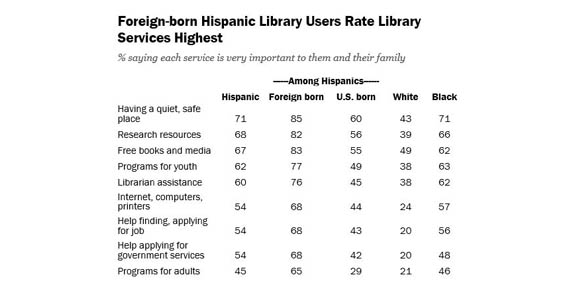
In a study just released by Pew Research Center, a survey of 6,224 Americans, including 739 Hispanics, found that immigrant Hispanics tend to value library services more highly than other demographic groups, despite the fact that they are less likely to have visited a public library or to indicate that accessing a library would be “very easy.” Just 60% of immigrant Hispanics report having visited a library or bookmobile at some point, while at least four-fifths (80%) of U.S. born Latinos, whites, and blacks reported the same.
For both U.S. born and immigrant Latinos, though, public library services are rated very highly. Immigrant Hispanics in particular are 3 times as likely to rate services beyond book lending as important. Services rated the highest by Latinos include help finding and applying for a job and help applying for government programs, permits or licenses. Though Hispanics overall tend to use the library less, they are just as likely (65%) as whites and blacks (63% and 64%, respectively) to say that their library closing would have a major impact on their community.
Pew notes that one possible barrier to access and use among Hispanics, especially those that are first-generation immigrants, is language. Pew’s positive findings about Hispanics’ attitudes toward public libraries underlines the need to continue advocating for Latino populations and opening up avenues of access. The fact that Hispanic library users are disproportionately young compared with other demographic groups – nearly two-fifths (39%) are 16-29 years old – means that public libraries have the opportunity to foster many life-long learners among all Latino groups.
Want to know more? You can read Pew’s full report on public libraries and Hispanics here.
Note: This post is part of our series, “The Weekly Number.” In this series, we highlight statistics that help tell the story of the 21st-century library.